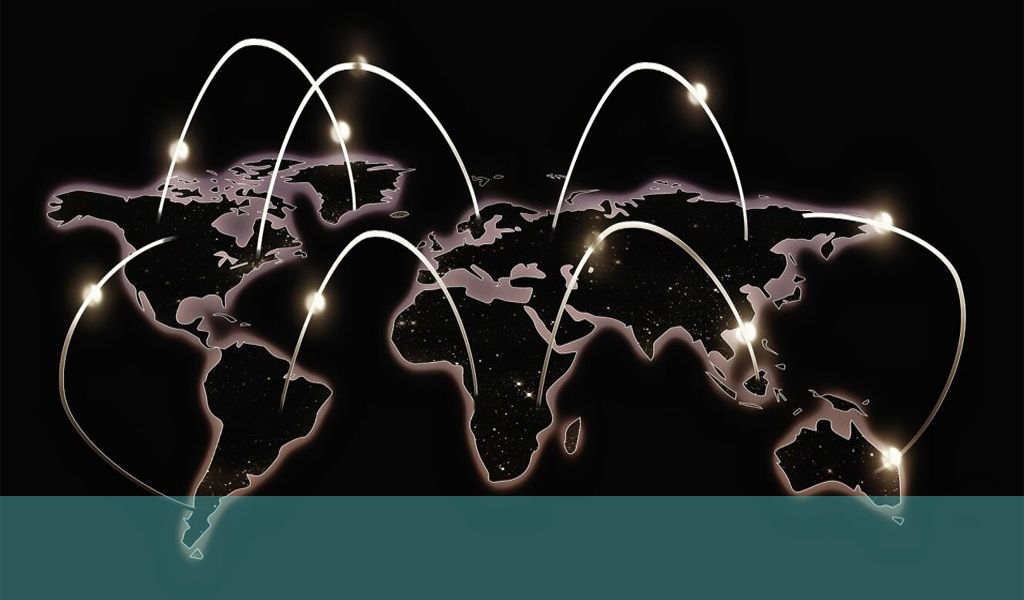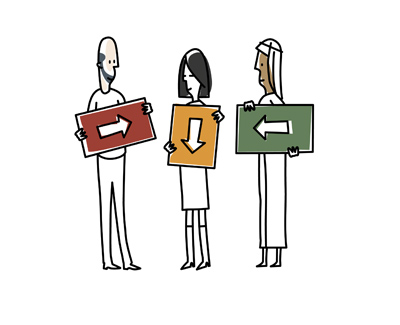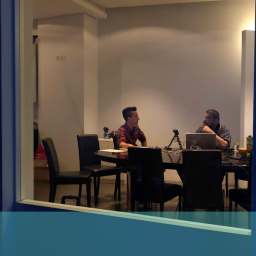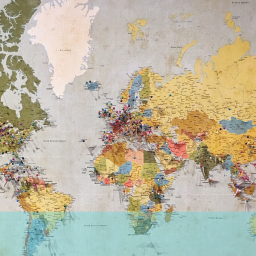
In the ever-evolving landscape of user experience research, a global perspective is more crucial than ever. Join me as I delve into the challenges, triumphs, and unique insights about international user research with two of my colleagues, Mónica Emch and Christina Tan, both Senior UX Researchers at UX24/7.
Mónica, is based in Barcelona and her experiences span Germany and Slovenia. Christina’s journey took her from Malaysia to the Netherlands and finally to the UK.
In this interview, I explore their journeys, reflecting on how their international backgrounds impact their work in UX research. From the intricacies of adaptation to building trust across diverse cultural contexts, they share valuable advice for researchers considering running research globally.
An introduction to Mónica and Christina
Paul: Mónica and Christina, it’s great to talk to you outside of the day to day of UX24/7. Could you each briefly introduce yourself and share a bit about your roles as Senior UX Researchers at UX24/7?
Mónica: Hey! I am Mónica, a PhD graduate in Neurosciences and a citizen living in the beautiful coastal city of Barcelona. I come from the academia world and have made the transition into the UX world after the pandemic. I’ve been working as a senior UX Researcher at UX24/7 for 11 months. Together with the team we work with clients who come to us to help them alleviate their user problems. Specifically, I work in the delivery team, where I am responsible to run research studies. I work closely with clients to understand their research objectives, and depending on their needs, I conduct research in German, Spanish or English. I then analyse results from the research to create and present a report, with findings and recommendations to the involved stakeholders.
Christina: Hey there, I’m Christina! I’ve been working as a UX Researcher for over 13 years now. I started out in Malaysia, moved to Netherlands, and I’m currently based in the UK. I’ve worked with Product Managers and Designers in different companies across Europe and Asia, mainly in the Telecom and B2B sectors.
Beyond research, I’ve also led research operations and scaling UX initiatives within companies. I joined UX24/7 in the spring of 2023. Just like Mónica, as a Senior UX Researcher at UX24/7, I’m focused on uncovering customer needs for our clients across different industries. I help our team plan, manage stakeholders, and execute research using my UX research toolkit to help our clients make better user experience decisions.
Paul: You both have very interesting international backgrounds, could you elaborate on how your time living in different countries has shaped your approach to UX research and its impact on your role at the agency?
Mónica: I come from Barcelona, but I have spent several years living in Germany and Slovenia. I know it will sound “cliché”, but it is true that living abroad broadens your horizons. It allowed me to have an open mind to the way other people live and the topics they deal with in their daily conversations, as the challenges they face are completely different. This allowed me to approach users in a more personal and comprehensive way, as I see them as complex human beings, rather than locking them in a box and simply labelling them.
Also, we should not forget that people who speak several languages, also face challenges differently depending on whether the problem is presented in their native language or not. Facing challenges at work in my non-native language(s) gave me the opportunity to make more utilitarian decisions, reducing the impact of intuitive emotional concerns. That’s not the case in Spanish, where it is much more difficult not to take things personally. So, working in English or German helps me to become a better UX Researcher and detach from the problems. 😉
Christina: Working on diverse UX research projects in both client and agency settings has given me a ton of experience when it comes to managing and facilitating UX research projects internationally. It is challenging, especially when working with people from different backgrounds and cultures and not having to be able to speak in your comfort language. However, I’ve learned that it can be an excellent opportunity for personal and professional growth if you’re open to change.
Change has helped me better understand teamwork dynamics, different user perspectives and cultural influences. One thing I’ve learned is that you’ve got to be adaptable to succeed in agency projects. They’re typically fast paced and have limited client immersion time and information to work with. Embracing change allowed me to move quickly from one project to another, working with different stakeholders and goals, mixing research methods which eventually improves my abilities.
Participant recruitment challenges
Paul: Mónica, a critical aspect of UX research involves participant recruitment. I understand that you met certain difficulties in this regard during your academic endeavours in Germany. Could you kindly share the details of how you successfully tackled this challenge and the valuable insights you gained from that experience?
Mónica: During my PhD years in Munich, Germany, I needed to recruit participants for my ongoing longitudinal study, in which we were interested in understanding brain activity and cognitive performance after participants undertook online working memory training. I vividly remember how difficult it was to recruit participants, as it required quite a bit of work on the part of the participants and the compensation for them was not great. I was a bit desperate, and we did not have any budget listed to spend on recruitment.
Specifically in academia you don’t have a big budget to conduct research under good conditions, so I had to rely on my originality and fresh ideas. I remembered putting up posters with my phone number around the hospital where the study was being conducted, but I had no luck after some weeks. So, we needed to recruit healthy middle-aged participants to get the study going and then I came up with the idea of creating an account on “eBay Kleinanzeigen” (the German equivalent of any website where you can post anything you sell or want to buy) to post there that we were looking for participants for the study. After all, we needed people who were confident with technology to conduct the memory training on their computers. My supervisor at the time thought it was a magnificent idea (she believed in me even before I did). After I posted it, I got a lot of calls, and let’s face it, some of them were strange, but luckily, I got what we needed, and the study went ahead.
I also learned that at work, and especially in life, it is important not to always play it safe, because then unexpected things and ideas come up. And always rely on people that believe in you, especially in the moments when you doubt yourself the most!

Unfamiliar cultures
Paul: Christina, I remember your story about conducting research in Ukraine was quite an adventure. Can you share with our readers on how you navigated the challenges of working in an unfamiliar cultural setting and what you learned from that situation?
Christina: Oh yes! It’s one of my unforgettable moments working at a telecommunication company during my previous job. I had to conduct focus groups in Ukraine, a place I’d never been to. My long list of tasks was planning the research, finding participants, and collaborating with a local team, research agency, and a translator. It was a complex process with so many parties involved that I was overwhelmed with the details.
I was looking for a research lab that would fit my needs, but I also wanted the atmosphere to be relaxed and informal. My goal was to create a comfortable environment where participants would feel at ease sharing their stories. I got so caught up with logistics that I forgot to use my research toolkit, which was silly. Side note – my research toolkit consists of tricks/resources that helps me simplify a task. Using my all-time favourite tool, ‘back to basics’, I asked myself, “What do people do when they want to relax and chat?” I realised that socialising is the answer, a fundamental aspect of human behaviour in this setting. And where do people commonly socialise?… At a cafe, of course! With the support from my local partner, we found a cafe that accommodated everyone – the participants and the observing stakeholders. They even helped me invite the participants since they knew the proper social times.
Running the focus groups with a translator is the hardest bit of the project. The first session dragged on twice as long because of the lack of coordination between me and the translator. It was exhausting and messy. I knew there was a better way to manage the situation and so, I let the translator lead the second session while I observed. This last-minute change was nerve-wrecking. I ‘let go and step back’, and I trusted the process. It was a success knowing that’s the best solution.
The lesson I learned from this experience is to allow myself to make and learn from mistakes. I also realised that finding the right research partner including the translator and trusting them is crucial, especially when you’re not an expert in a cultural setting.
Research Operations
Paul: Since joining UX24/7 you have of course been working with our Research Operations team, can you tell me how that compares with your previous experiences?
Mónica: When I finished my PhD and I moved into UX Research, I learnt how important it is to dedicate time and effort to finding the suitable participants for your research, as the entire quality of the results will depend on it. To conduct international research, it is important to understand that there are different screening criteria to be considered, and not rely on “just getting the quota”. Therefore, I learned that having a Research Operations Manager like the one we have at UX24/7 is essential to obtain high-level results from the study.
My confidence in adaptability comes from my time as a PhD student, where new challenges arose almost on a daily basis, as many things were out of my control (e.g., compensation did not reach a participant and they sent me angry emails, scanning time at the hospital was delayed because there was an urgent case…). This means that I can quickly adapt to circumstances that may arise during a research project, as we sometimes deal with different stakeholders and each of them has a different goal about the project. To lessen future problems, it is essential to have some meetings with them to set the expectations on how the research will be conducted. Alignment in life is super important!
Paul: Christina, what do you think are the main benefits from working with local partners in international research projects?
Christina: Based on my research experience in Ukraine and several other countries, I learned that collaborating with a local partner is super important when conducting international research. They’re able to provide valuable consultation and fill in any missing pieces of information. You may have preconceived assumptions, but having people on the ground who are part of the culture can give you more confidence in your research especially on how to manage participants. Plus, you can avoid any misunderstandings or faux pas which can lead to distrust. By establishing trust with participants, you can be sure that the research outcomes are authentic and reliable.
Advice to other researchers
Paul: Mónica, you’ve made significant career transitions. What advice would you give to individuals considering a career change, especially in a new country or industry?
Mónica: I actually wrote an article about my transition from academia to UX Research on Medium. There is one thing I would urge anyone who is transitioning to do: Therapy. We go to the gym to maintain our physical health, but not everyone goes to therapy to maintain their mental health. My life would have been so much easier if I had let Mental Health Professionals helped me first, because neither pursuing your career in another country nor switching careers is going to be easy (tell me about it, I did both). And you should allow yourself to fail but don’t get hang up there and keep pushing.
Paul: Christina, embracing change seems to be a central theme in your career. What tips can you offer to those looking to embrace change and adapt successfully, both in their careers and in research?
Christina: Embracing change is not easy, and I agree with Mónica about mental health. I had my fair share of feeling homesick and stubborn with my ways of working. Having the growth mindset is essential while adjusting in different environments; the key is to observe others and be brave to make mistakes. Take the initiative to learn about the culture, engage in cultural conversations with your colleagues and be honest with your thoughts.
And when it comes to research, having a general framework to work with is always helpful – just make sure to tailor it to your specific project. And if things get too overwhelming, it’s okay to simplify and step back to basics. Also, have trusted research partners around you to guide and support your decisions. Remember, we’re all in this together.
Paul: Christina, Mónica, thanks for sharing your thoughts and experiences about international research and life as a researcher moving between markets.
Summary
I started out hoping to find out about how the experiences from two of my senior research colleagues has shaped their thinking about how UX research is organised and conducted on an international scale. But what I also learned, thanks to Mónica and Christina’s candour was a real insight about what it’s like to leave your home country and go work in different markets.
What came across very strongly is the value of collaboration with local partners and how they can help build bridges and trust across unfamiliar cultures. It is also apparent that you need to be adaptable and be open minded about creative solutions to make the research happen swiftly.
It seems you also need to be strong willed and resilient if you are going to leave your home and work in new markets. As well as having a natural curiosity which of course, many researchers innately possess.
If you are considering following Christina and Mónica and planning to live & work in a different country or thinking about conducting research internationally and would like to learn more, get in touch at hello@ux247.com.

















